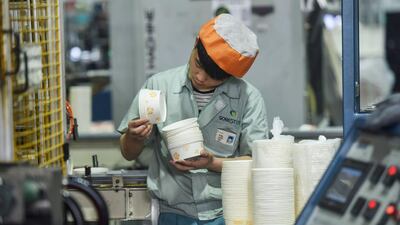China notched its slowest expansion since the 2009 financial crisis last quarter amid a debt clean up and trade woes, while signs of stabilisation in December suggest government efforts to cushion the deceleration are beginning to take hold.
Gross domestic product rose 6.4 per cent in the fourth quarter from a year earlier compared with 6.5 per cent in the previous three-month period. In December, gauges of consumption and factory output accelerated, while investment held up.
The world’s second-largest economy is on a long-term slowing trajectory as it shifts from the investment-led model of the past while carrying a heavy debt load. The government’s response with targeted stimulus measures is being tested by the standoff with US President Donald Trump over trade at a time when the global expansion is already looking shakier.
"Growth will improve from the second quarter onwards," said Morgan Stanley's chief China economist Robin Xing in Hong Kong. "The greater the downward pressure on growth, the stronger the policy response will be."
The data contributed to a continued rally in Asian stocks. Shares in Tokyo, Hong Kong and Sydney climbed after the S&P 500 Index hit its highest since early December on Friday.
___________
Read more:
China to double foreign investment programme quota to $300bn
Slump in China's foreign trade turns screw on deal with Trump
China’s engine of growth could finally run out of steam in 2019
___________
For the full year, the economy expanded 6.6 per cent, the slowest pace since 1990 and in line with estimates. Although it has moderated significantly from the years of double-digit growth, China is still one of the fastest growing large economies and its larger size now means it remains the world’s growth engine.
A breakdown of the data indicates modest signs that government stimulus may be working, albeit slowly. Investment in infrastructure continued its pickup from a nadir reached in September. Industrial output data signal stronger activity in construction, with glass and cement output both accelerating.
The retail sales breakdown also went some way to counter fears of a slump in consumer confidence, showing that the decline in auto sales far outpaces any weakening in other items. Sales of household electronics, furniture, clothing and food all accelerated.
“More crucial than the GDP figure for me was that retail sales didn’t see any further deterioration,” said James Laurenceson, deputy director of the Australia-China Relations Institute at the University of Technology in Sydney. “As long as services and retail sales are holding up, generally speaking China can get by. But if those remaining drivers of growth start to tank, then the trouble becomes very significant indeed.”
So far, the government and central bank have tried to stimulate the economy without resorting to a massive credit flood and infrastructure binge like in 2009. The People’s Bank of China has been quietly guiding interbank borrowing costs down without actually cutting official interest rates, and the fiscal authorities have pressed on with tax cuts and expedited government bond sales, among other policies.
With President Xi Jinping’s top economic aide Liu He heading to the US this month, the challenging economic background adds pressure to reach a deal on trade. According to people close to the discussions, the two sides have so far made little progress on the issue any deal Mr Trump strikes with China may ultimately be judged on: ending what the US has dubbed as decades of state-coordinated Chinese theft of American intellectual property.
Due to the massive size of its market, China’s slowdown is also bringing pain to companies and industries worldwide. Auto sales in the most populous nation dropped for the first time in three decades last year, hurting prospects of not only local manufacturers but also of companies such as Volkswagen and Toyota Motor.
Meantime, a downturn in iPhone sales in China has hurt Apple’s share price this month and raised question marks over whether the consumer can keep cushioning the economy’s re-balancing away from the old smokestack industries.
If the slowdown deepens, authorities may resort to more aggressive easing such as relaxing property purchasing curbs in the biggest cities, economists have speculated. Following the data, analysts were split over how much confidence the most recent numbers inspire, though most agreed the government will react if data worsen.
"There will be more stimulus, more monetary easing, more infrastructure investment, which will support the jobs in the manufacturing sector even if the business activities are low,” said Iris Pang, an analyst at ING Bank in Hong Kong.

